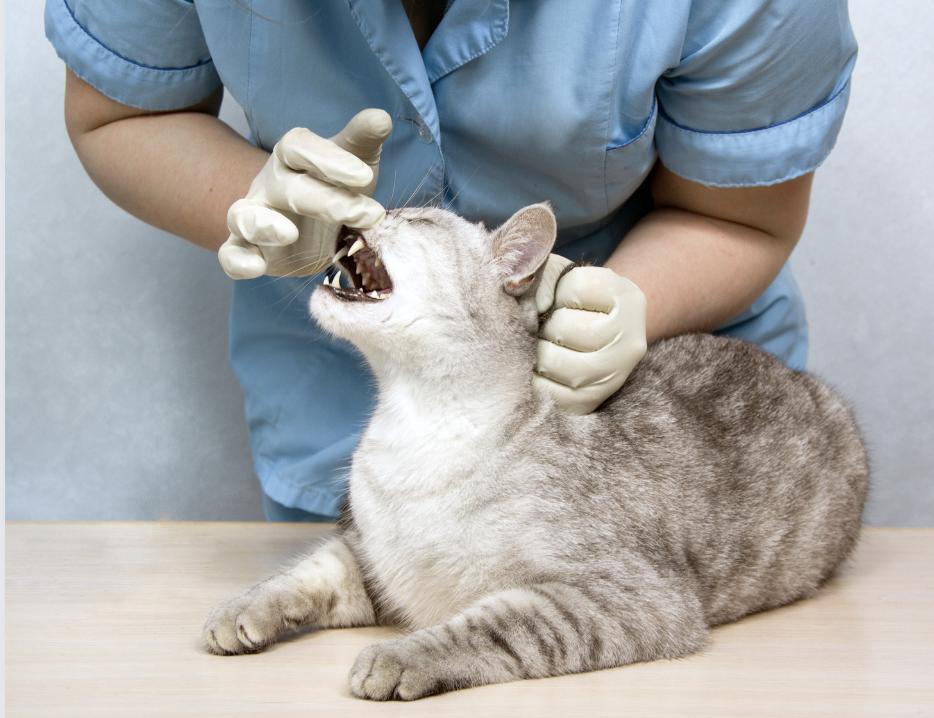By the age of 3, 80% of cats show signs of dental disease. For this reason, cat owners pay $200 to $400 in dental care fees every year.
Like humans, consistent dental care is necessary for a cat’s health. But unlike us, house cats often lack the ability to clean their teeth.
Wild cats chew on rough materials like bone and sticks. This helps remove plaque buildup and keep teeth healthy. Without this, our cats are prone to tooth problems that can cause pain and illness. So, it’s important that we take proactive steps to care for their teeth.
Today, we’ll learn about the ins and outs of cat oral health, so we can take better care of them (and save some cash in the process).
Why is cat oral health important?
Gum disease is a common problem for cats. It’s caused by excess plaque, a layer of bacteria and sugar that coats the teeth.
Many animals have plaque, including us. When our teeth feel fuzzy, that’s plaque.
If plaque isn’t removed often, it hardens and turns into tartar. Tartar releases harmful bacteria, and is difficult to remove.
Tartar buildup in cats can cause gum disease, which can lead to:
* Bad breath
* Gum inflammation and pain
* Infection
* Loose or broken teeth
* Jawbone damage
* Kidney disease
* Heart disease
Signs of dental disease in cats
Cats can’t just say, “my teeth hurt, please help me”, so it’s important to watch for potential signs of trouble, like:
* Disinterest in dry food or treats
* Pawing at the mouth
* Drooling (more than usual)
* Bleeding gums
* Dropping food while eating
* Eating slowly
* Avoiding having their face or mouth touched
How to care for a cat’s teeth?
Being proactive about our cat’s oral health is the best solution to future problems.
Regular dental check-ups
The first step to ensuring our cat has great oral health is to schedule regular vet check-ups. Cats should have their gums and teeth examined every 12 months, minimum.
Brushing a cat’s teeth
Brushing our cat’s teeth might seem unusual or scary. But it’s one of the most helpful ways to remove plaque. Patience and practice, especially if started early in a cat’s life, will ensure it’s a good experience for everyone.
To brush a cat’s teeth:
1. Choose a calm, quiet place, and time. It should be the same time each day, as cats thrive on routine.
2. Get the cat used to having their mouth and teeth touched. The first few times, we can dip a cotton swab in tuna juice. Let the cat smell it, and get familiar with it.
Then, gently pull back their lips. It isn’t necessary to open their mouth all the way, as only the outer teeth need to be brushed.
Gently rub the cotton swab where their teeth and gums meet. If they only tolerate this for a few seconds, that’s okay. We can try the next day, until they’re used to it.
3. Then, get a soft-bristled toothbrush and toothpaste made for cats. Do not use human toothpaste, as it can hurt cats.
4. Let the cat sniff and taste the toothpaste, and then brush the outside surface of their teeth.
5. Repeat daily, or 3 days per week minimum, if time doesn’t allow daily brushing.
Provide dental-friendly food and treats
Diet plays a large role in a cat’s oral health. Giving them food and treats that are designed to clean their teeth is helpful.
Also, like humans, it’s best to avoid sticky or sugary foods, as these can cause tooth decay. Plus, cats may not have the genes to be able to taste sweet foods anyways.
Provide toys and activities for teeth cleaning
In recent years, the market for dental cat toys has grown. These toys require a cat to chew, which can stimulate gums and remove plaque, and include:
* Catnip-infused dental toys
* Puzzle feeders
* Kongs
Key takeaways
* Regular dental check-ups and brushing are critical, proactive steps for a cat’s oral health.
* Monitoring our cat’s teeth and gums for signs of problems is necessary for early dental disease detection and treatment.
* Providing dental-friendly food, treats, and toys can also help promote oral health.
Want to spend less on vet dental bills? Get Wagmo pet insurance and save.
Sources
https://www.rspcapetinsurance.org.au/pet-care/cat-care/guide-to-cat-dental-care
https://www.petmd.com/cat/wellness/how-much-does-cat-teeth-cleaning-cost
https://vcacanada.com/know-your-pet/dental-pain-in-cats
https://www.avma.org/resources-tools/pet-owners/petcare/pet-dental-care
https://www.petmd.com/cat/nutrition/can-cats-taste-sweet-things

